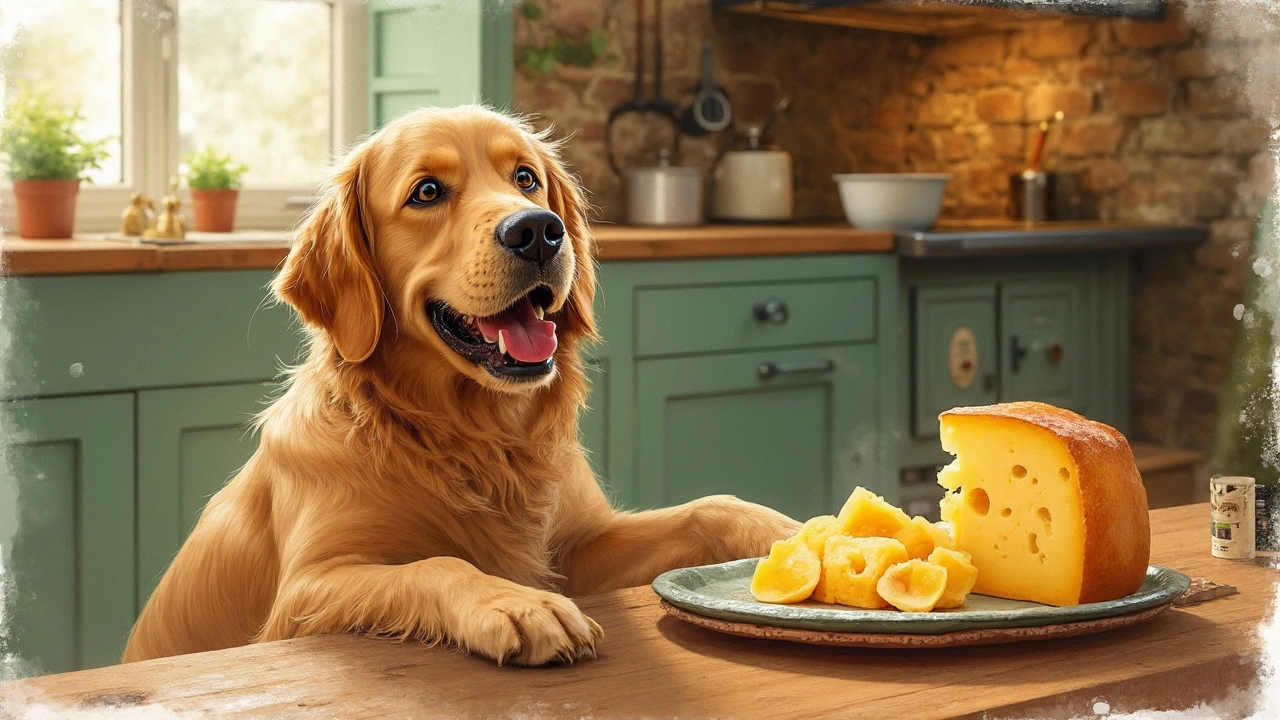Ever wondered if it's okay to feed your dog cheese? It's a question many dog owners ponder, especially when those puppy eyes are begging for a bite of your snack. The simple answer is yes, but with a few cautions. Cheese isn't toxic to dogs, which is the good news. However, not all cheeses are created equal, and there are a few things to watch out for.
First off, cheese can be packed with fat and calories. Feeding too much can lead to weight gain or even pancreatitis, a serious illness in dogs. So, it's essential to offer cheese in moderation, like a special treat rather than a regular part of their diet.
On the flip side, cheese is rich in protein and calcium, which can be beneficial for your dog's health. Some dog owners even use cheese to hide pills or as a training reward, which can work wonders given how irresistible cheese is to most pups.
- Why Dogs Love Cheese
- Nutritional Benefits of Cheese
- Potential Risks of Cheese
- Types of Cheese to Avoid
- Safely Adding Cheese to a Diet
- Alternate Cheese Treats
Why Dogs Love Cheese
Dogs and cheese have an undeniable connection. But have you ever wondered why your pup goes crazy over it? Well, it's all about the smell, texture, and mouth-watering taste that makes cheese practically irresistible to them.
Smell and Taste Sensations
Cheese is packed with strong aromas and flavors that truly captivate a dog’s keen sense of smell. Canines have up to 300 million olfactory receptors in their noses compared to just 6 million in humans. This extraordinary sense allows them to detect even the faintest traces of cheese in the air.
Texture and Feeling
The variety of textures available in cheese—from soft to hard—provides a unique mouthfeel experience for dogs, which adds to the sensory delight. It’s like a chewy toy that also happens to be incredibly tasty!
The Protein and Fat Connection
Cheese is high in protein and fat, two nutrients that dogs are naturally inclined to crave. These components provide energy and are essential in a dog's diet. This craving is similar to us reaching for a rich, satisfying snack—it's tough to say no!
Versatile Training Tool
For many dog trainers, cheese is the go-to treat for training sessions. It's easy to cut into small pieces, doesn't require long prep, and most importantly, it holds a dog's attention like nothing else. This can be especially helpful when teaching particularly tricky commands.
Nutritional Benefits of Cheese
Cheese isn’t just a delicious snack for us humans; it can have some perks for our furry friends too. When used the right way, cheese for dogs can be a great supplement.
Protein Boost
First up, cheese is rich in protein. Protein is crucial for building and repairing body tissues and cells in dogs, just like it is for us. Think of it as the building blocks that support your pup’s muscles and overall strength.
Calcium for Strong Bones
Next, there's calcium, another important nutrient found in cheese. Calcium helps maintain strong bones and teeth in dogs. The added bonus? It also contributes to proper nerve function and muscle control. So, a little cheese can support your dog’s physical health as well.
Vitamins and Fats
Many types of cheese also come loaded with essential vitamins like vitamin A and B-complex vitamins. Vitamin A supports your dog’s vision and immune function, while B vitamins benefit energy metabolism. Not to mention, the healthy fats in cheese can provide your dog with a quick energy burst. However, these fats mean you should keep portions small to avoid packing in too many extra calories.
| Nutrient | Amount (per 1 oz of cheddar) |
|---|---|
| Protein | 7 g |
| Calcium | 200 mg |
| Vitamin A | 75 mcg |
Remember to always adjust the amount of cheese you offer based on your dog’s size and dietary needs. Smaller breeds will need less than larger breeds, and always keep an eye on any signs of lactose intolerance. So, sprinkle some cheese into your dog’s routine, but keep it balanced!
Potential Risks of Cheese
While cheese can be a delightful treat for humans, it isn't always the best choice for our furry pals. Let's dive into some specific risks associated with feeding cheese to dogs, so you can make informed decisions for your pup's health.
Lactose Intolerance
Just like some people, dogs can be lactose intolerant too. This means their tummies have trouble breaking down lactose, the sugar in milk-based products. If your dog has diarrhea or gas after eating cheese, it could be a sign of lactose intolerance. In this case, it might be best to avoid feeding them cheese altogether to prevent any tummy troubles.
High Fat Content
Most cheeses contain a lot of fat, which can be a double-edged sword. Too much fat is not great for dogs and can lead to obesity and more serious issues like pancreatitis. Maintaining a balanced diet for your dog means keeping these fatty treats in check, so save the cheese for sparing, special occasions.
Pancreatitis is a scary word, but it basically means inflammation of the pancreas. A high-fat diet can trigger this painful condition in dogs and result in symptoms like vomiting, diarrhea or even lethargy. So, moderation is key.
Salt Content
Another concern with cheese is its salt content. A diet too high in salt can cause increased thirst and more frequent urination. In the long run, it might strain your dog's kidneys. Low-sodium options exist, but again, small amounts are essential.
Table of Risks by Cheese Type
Here's a quick breakdown of a few types of cheese and their risks, which might help you decide on safer options:
| Cheese Type | Risk Factor |
|---|---|
| Cheddar | High fat, moderate lactose |
| Brie | High fat, high lactose |
| Cottage Cheese | Low fat, moderate lactose |
| Feta | High salt, high lactose |
Training and Medicine
Cheese can still be handy, though. Many dog owners use tiny bits of cheese to hide pills, making medicine time a breeze. Just ensure the portion is small enough to avoid any upset. And for training purposes, consider using real dog treats designed with health in mind instead of relying solely on cheese.

Types of Cheese to Avoid
While cheese can be a delightful treat for your dog, not all cheeses are dog-friendly. Some varieties contain ingredients that could harm your pup. Here's a quick rundown of what to watch out for.
Avoid Blue Cheeses
First up, steer clear of blue cheeses like Roquefort, Gorgonzola, and Stilton. These cheeses contain a substance called roquefortine C, which can be toxic to dogs. According to veterinarian Dr. Emily Parker,
"Even small amounts can cause vomiting, diarrhea, and even seizures in sensitive dogs."
Say No to Flavored Cheeses
Flavored cheeses might sound exotic, but they are a no-go for dogs. Those mixed with garlic, onions, or herbs can lead to an upset stomach or worse. Garlic and onions, in particular, are harmful to dogs in any form.
Watch for High-Fat Cheeses
Another category to be wary of: high-fat cheese. Varieties like Brie and Cheddar are delicious but loaded with fat, which isn't great for your dog’s waistline. Over time, this can lead to obesity and related health problems.
Beware of Lactose Content
Some dogs struggle to digest lactose, so it’s wise to go easy on high-lactose cheeses. Soft cheeses, like Camembert and Feta, can cause upset stomachs in lactose-intolerant pups.
Ensuring you choose the right type of cheese for dogs is key, and avoiding the wrong ones can keep your furry friend happy and healthy.
Safely Adding Cheese to a Diet
So, you've decided to introduce cheese for dogs into your furry friend's diet. Great choice! But there's a right way to do it to keep your pup happy and healthy.
Start Slow
When adding cheese, start with a small piece the size of a pea. Monitor your dog for any signs of lactose intolerance, like diarrhea or gas. If they handle it well, you can gradually increase the portion size, but be mindful not to overdo it.
Choosing the Right Cheese
Not all cheeses are okay for dogs. Avoid processed cheese and opt for lower-fat options like mozzarella or cottage cheese. These choices are easier for dogs to digest. A good rule of thumb: if it's good for you, it's more likely to be okay for them.
Watch the Fat Content
Cheeses high in fat can contribute to obesity, a common issue in pets. Here’s a quick reference:
| Cheese Type | Fat Content |
|---|---|
| Cheddar | 33% |
| Mozzarella | 22% |
| Swiss | 27% |
Stick to low-fat options and adjust other parts of the diet to balance it out.
Use Cheese as a Tool
Cheese is not just a tasty treat; it can be a useful tool. Many owners use it for hiding pills or as a training aid. Its strong smell and flavor make it perfect for getting your dog's attention or disguising medicine they might otherwise spit out.
Moderation is Key
Even though cheese can be beneficial, it's essential to remember moderation. Keep cheese treats to about 10% of your dog's daily calorie intake. This way, you won't disrupt their balanced diet.
By following these tips, you can safely make cheese a part of your dog's diet while keeping it enjoyable and healthy.
Alternate Cheese Treats
Thinking of spicing up your dog's snack time without the regular slices of cheese? You've got options! While cheese for dogs is a delightful treat, it’s important to switch it up, keeping your pup excited and their diet balanced.
One interesting option is lactose-free cheese. Some dogs can be lactose intolerant, just like people, which makes lactose-free varieties a clever swap that doesn’t skimp on taste.
Cheese-Flavored Dog Treats
Commercially available cheese-flavored treats can also do the trick. These are specially designed to be yummy with the cheesy taste dogs love without the drawbacks of real cheese, like high-fat content.
Homemade Cheese Snacks
If you enjoy a little cooking, making your own dog treats at home can be rewarding. Mixing small amounts of mild cheese like mozzarella with oats or rice flour lets you control the ingredients and portions. Try baking tiny bite-sized cheese cookies for a crispy, cheesy delight.
- Combine 1 cup of oats with half a cup of grated mozzarella
- Add a splash of water to bind the mix
- Shape into small cookies and bake at 350°F for 20 minutes
These are easy, fun, and can be stored for a week of healthy snacking!
Cottage Cheese Delight
Another neat choice is cottage cheese. It's lower in fat than most other cheeses, packed with protein, and can be a scrumptious topping over dog kibble for a nutritious boost. Just make sure it’s plain, without added salt or flavors.
Remember, the key is moderation. While these dog health snack ideas offer variety and fun, keeping a close eye on portion sizes ensures your dog stays healthy and happy.
